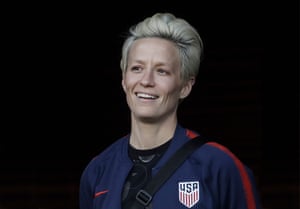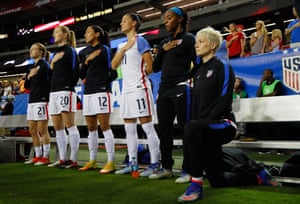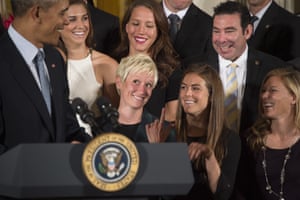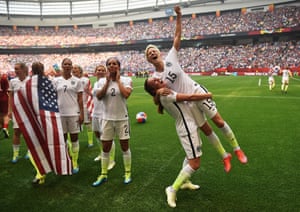The Guardian – Interview
Megan Rapinoe: ‘Maybe men should just take a few hundred years off’
The US midfielder talks about why women are at the forefront of fighting injustices and whether she feared for her football career after taking a knee during the national anthem

“As I’ve grown older I’ve really got to understand how powerful one voice can be, my voice can be, or the team’s voice can be. So to hold that back or not to use that just seems selfish in a way.”
If that is the case, Megan Rapinoe is anything but selfish. A World Cup winner and Olympic champion with the US women’s national team, Rapinoe could easily be satisfied with her lot. But just enjoying the spoils of her success is not enough.
Rapinoe has been a vocal advocate for LGBT rights groups since coming out before the 2012 Olympics. She set out to raise $100,000 for those affected by the Carr fire that ripped through her home county, Shasta, last summer, destroying 1,604 buildings as it became the sixth most destructive fire in California history. And, on 4 September, 2016, before kick-off against Chicago Red Stars, the Seattle Reign midfielder went down on one knee during the playing of the national anthem in solidarity with the protest of the San Francisco 49er’s player Colin Kaepernick.
“I think I want the same for myself,” says the 33-year-old, who 11 days later knelt again before USA played Thailand. “Being a white, female, gay athlete. Obviously not everybody is that but it doesn’t mean I don’t want the support for everyone in all of the things I’m fighting for.
“We understand that athletes are idolized and glorified in our culture and it was about using that platform to just support and give support to what he was saying. It became a very racialized issue, a black versus white thing, but it’s not.

“We all should be supporting what he’s saying. The statistics don’t lie – people of color in prison, people of color that are disproportionately arrested, monitored by police, police brutality against people of color.
“It’s not really an issue of whether police brutality exists or not, or whether racism is still an issue or not. It very much is and I think it’s foolish to say it’s not.
“The more we reckon with that quickly, recognize that these things are happening and believe the people that are standing up and telling their stories, then the quicker we can find solutions and start to make progress in breaking down those barriers that are so harmful to so many people.”
Did she ever fear for her career? Kaepernick has not thrown a football professionally since his release by the 49er’s and has a case pending alleging NFL bosses have colluded to keep him out of the game for his stance. “Yeah, I mean as soon as I kneeled they made a rule that you had to stand,” says the creative midfielder nicknamed Rapinho or Rapinodinho.
“I don’t know what would have happened if I had continued to kneel, maybe the same thing that happened to Colin. I kind of feel like that’s sort of what they were after. They made it very clear that they were not going to respect my free speech or my decision to peacefully protest in that way and made it very clear that it was unacceptable and that I should be privileged or feel privileged to play for the country. I personally thought it was a very patriotic thing that Colin started.”

Despite growing up in the small conservative northern Californian town of Redding, Rapinoe’s social conscience was a natural progression of values ingrained from an early age. “It wasn’t like I grew up in a super liberal household or anything,” she says. “But you never know where people come from, or what their situation is. So you shouldn’t judge people. Give them the benefit of the doubt and be willing to extend yourself and stand up for people who maybe can’t stand up for themselves and just stand up for the right thing. It was never explicitly spoken about in our household but that was just how we were raised.”
Rapinoe was a natural fit for Juan Mata’s Common Goal. The organisation which encourages those around football to donate 1% of their earnings to organisations using the social weight of the sport to make real changes to communities and lives. She and her teammate Alex Morgan were the first women footballers to sign up.
“I just really love the whole concept. It’s first of all really simple. It’s 1% of your salary, so whether you make a dollar or a million you can do something that’s impactful. It can also be hard to research charities and vet different organisations and they do that for you which makes it really easy for the player. And it’s about being part of the bigger team of players all around the world.
”Obviously we’re at the highest level of this game and it’s given us so much, so to be able to harness that and give back to all these organisations that are already doing the work, already have boots on the ground, is just really cool to be a part of.”
The number of female players signing up, despite earning significantly less than their male counterparts, she believes, has its roots in the constant battle for equality at every level of the women’s game. “Women are always at the forefront of all this kind of stuff, racial inequality or pay inequality, maybe because we’re always having to fight for something and we truly understand what gender discrimination looks like and pay inequity looks like. It’s very close to home for us.

“We very much understand that it takes bold voices and bold steps to make things change. Our game is changing so much but it also has so much room to grow and we want to be a part of that and we really feel a responsibility to ensure we leave the game in a better place than where we found it. So, I don’t know what it is but maybe women are just better than men in that way.
“It’s like men have run the world for all these years, maybe they should just take a few hundred years off,” she laughs. “And we can just take it for a few hundred years and we’ll see where we are.”
Has having football in perspective made her a better player? “Yeah, it definitely has.”
